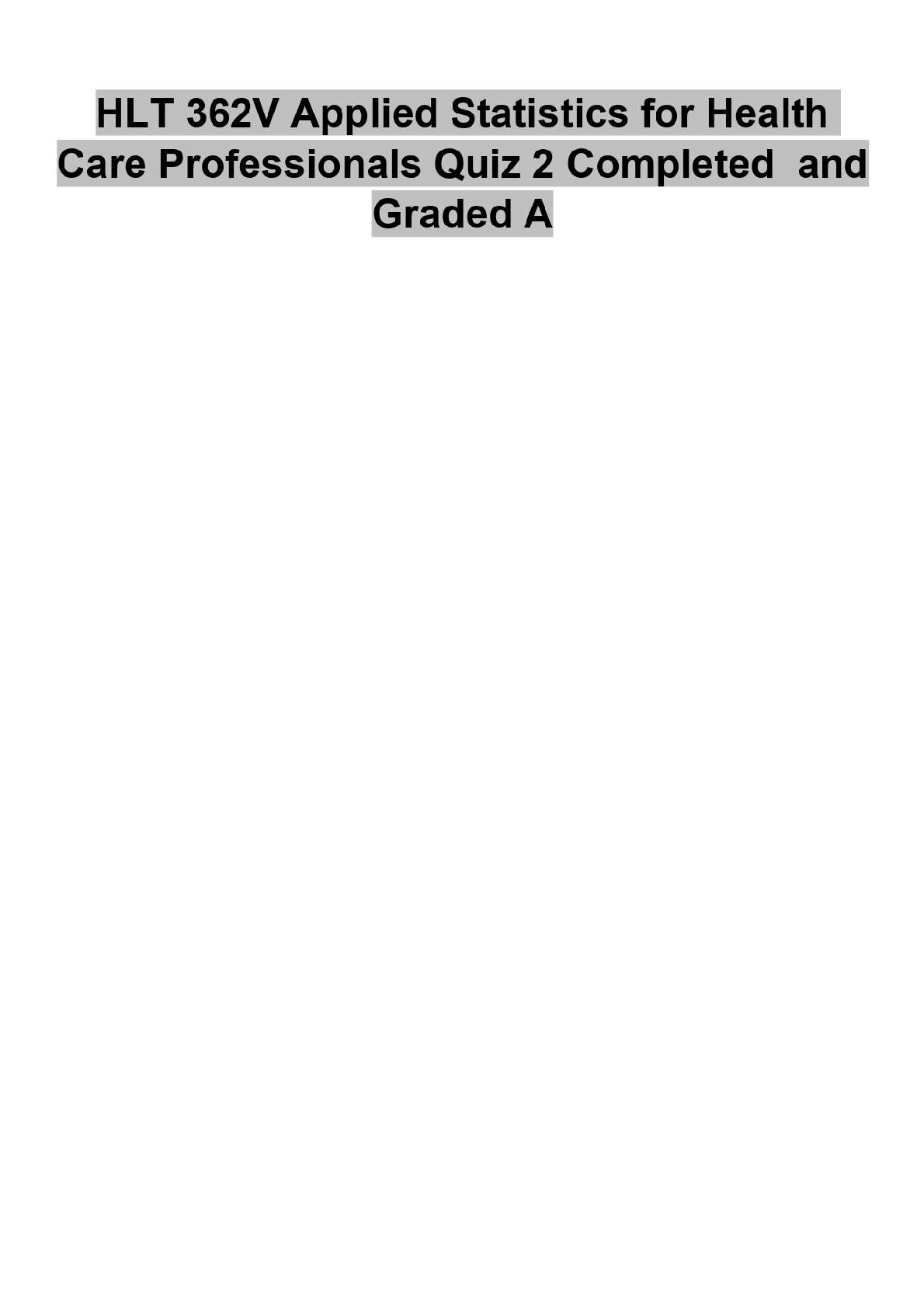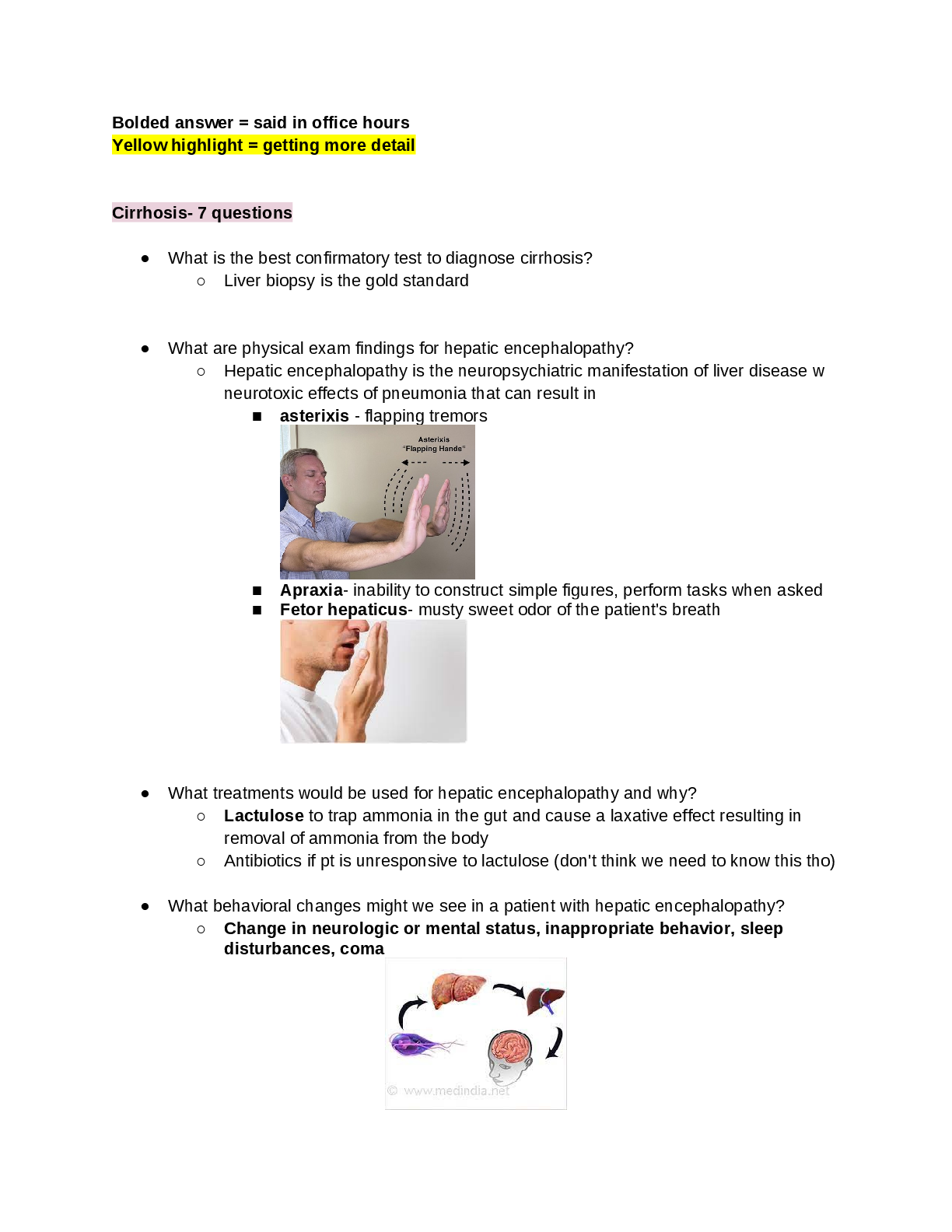healthcare > CHEAT SHEET > Adult Chronic Exam 2 Office Hours. Completed with elaborate responses and notes. (All)
Adult Chronic Exam 2 Office Hours. Completed with elaborate responses and notes.
Document Content and Description Below
Adult Chronic Exam 2 Office Hours. Completed with elaborate responses and notes. Bolded answer = said in office hours Yellow highlight = getting more detail Cirrhosis- 7 questions ● What is th... e best confirmatory test to diagnose cirrhosis? ○ Liver biopsy is the gold standard ● What are physical exam findings for hepatic encephalopathy? ○ Hepatic encephalopathy is the neuropsychiatric manifestation of liver disease w neurotoxic effects of pneumonia that can result in ■ asterixis - flapping tremors ■ Apraxia- inability to construct simple figures, perform tasks when asked ■ Fetor hepaticus- musty sweet odor of the patient's breath ● What treatments would be used for hepatic encephalopathy and why? ○ Lactulose to trap ammonia in the gut and cause a laxative effect resulting in removal of ammonia from the body ○ Antibiotics if pt is unresponsive to lactulose (don't think we need to know this tho) ● What behavioral changes might we see in a patient with hepatic encephalopathy? ○ Change in neurologic or mental status, inappropriate behavior, sleep disturbances, coma● What are nursing interventions that we would incorporate for a pt who has esophageal varices and got a balloon tamponade, what do we need at the bedside? ○ Esophageal varices are a complex of tortuous, enlarged veins at the lower end of the esophagus and/or stomach. If we require a balloon tamponade we need… ■ Scissors at the bedside to cut it in case it blocks the airway ■ Suction & oral care if on ventilator in ICU ● What medication would we use to treat ascites? ○ Diuretics to remove excess fluid from the body ○ “Dont need to know specific name” ● After a paracentesis to treat ascites what are concerning findings we would look out for? ○ Expected: weight loss, slight decrease in BP, easier to breathe d/t decrease in pressure ○ Unexpected: fever, s/s infection, sudden decrease in UO, chest pain, cloudy fluid, hypovolemic S/S (tachycardia, tachypnea, low BP), excessive bleeding from the site of aspiration, monitor for FE imbalance (loss of sodium & potassium ions), spontaneous bacterial peritonitis ○ “Its a rather simple question” GERD/HH- 3 questions ● What are lifestyle recommendations for someone with GERD/HH? ○ Don't eat late ○ Eat smaller more frequent meals ○ Foods to avoid: spicy, caffeine, citrus, ETOH, tomato based, chocolates, peppermits ○ Stay upright for 2-3 hours after eating ○ Stop smoking ○ Weight loss ○ No restrictive clothing● What does Barrett's esophagus raise a risk for? ○ Cancer ● How would you educate a patient for pharmacological treatment r/t GERD, specifically PPIs? ○ Scheduled medication, NOT PRN; but limit duration of use ○ Take on an empty stomach 30 mins before or 2 hours after a meal ○ Probiotics and B12 are recommended with this med ○ Longer acting, slower onset ○ Do not want to take them long term d/t SEs, so limit the duration ■ SEs: decreased bone density, kidney disease, decreased B12/mag, dementia ○ Ex. omeprazole, prilosec- PPIs decrease HCl secretion and esophageal irritation [Show More]
Last updated: 4 months ago
Preview 4 out of 15 pages

Loading document previews ...
Buy this document to get the full access instantly
Instant Download Access after purchase
Buy NowInstant download
We Accept:

Reviews( 0 )
$13.00
Can't find what you want? Try our AI powered Search
Document information
Connected school, study & course
About the document
Uploaded On
Mar 13, 2025
Number of pages
15
Written in
Additional information
This document has been written for:
Uploaded
Mar 13, 2025
Downloads
0
Views
34




